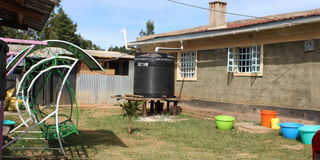Home giving solace to minors who survive SGBV

The Gender Mobilization Activities and Response Centre located in the outskirts of Eldoret town, Uasin Gishu County.
What you need to know:
- The Gender Mobilization Activities and Response Centre in the outskirts of Eldoret town, Uasin Gishu County, is among the few rescue centres in the region that offer a safe haven to survivors of SGBV mostly aged between two and 17 years.
- So far, 52 sexually abused children have gone through the centre since its doors opened in January.
Last August, Sabrina’s* (not her real name) mother left her under the care of a family friend as she flew to Saudi Arabia in search of greener pastures.
Her mother had secured a two-year job in Saudi Arabia, leaving her in the custody of her best friend. Little did Sabrina know that the husband to her mother’s friend would turn into a beast, defiling the young girl four times.
At some point, she says she decided to inform a pastor neighbour about her ordeal. And the man-of-cloth informed a local chief and police, before the perpetrator was eventually apprehended.
“The abuser would go to work with his wife and then come early and sexually abuse me. He repeatedly threatened me not to speak about the ordeal lest I faced the music,” recalls Sabrina.
Rehabilitation centre
She is among survivors of sexual gender-based violence (SGBV) at the Gender Mobilization Activities and Response Centre (GMAC) located in the outskirts of Eldoret town, Uasin Gishu County.
The centre is one of the few rescue and rehabilitation centres in the North Rift region that offer a safe haven to survivors of SGBV, mostly aged between two and 17 years.
“I have found hope here, hope for a better tomorrow. I pray that no child outside there goes through such tortuous experience,” states the young girl, who hopes to become a medical doctor.
Gregory* another minor also underwent through similar ordeal when a stranger sexually molested him. The 13-year-old had visited his elder sister but got lost. Since then, he doesn’t know the whereabouts of his family members.
Young children
“I got lost and I met a stranger who offered to help me but went on to assault me. It is a really traumatizing experience. I want tell those assaulting young children to stop the bad behaviour,” he says.
So far, 52 sexually abused children have gone through the centre since its doors opened in January. The 22 bed-capacity centre was started by a group of 11 women to provide temporary shelter survivors who are minors.
Margaret Alegwa, the centre’s director says they work in collaboration with the children’s department, the police and Moi Teaching and Referral Hospital’s care department that assists the survivors of SGBV.
“We started this centre after realising there are many cases of GBV among minors. However, we only take in children whose cases have been reported to the police and referred to us by the children’s office,” adds Ms Alegwa
She observes that they work closely with the Children’s Department to re-integrate the children with their families or relatives, most from outside the county.
Fully healed
“We also continue to make a follow up on the children after they leave the centre. We monitor whether they have fully healed from the trauma or not; we link those still traumatised to the nearest clinics for counselling,” says Ms Alegwa, a trained social worker.
At the facility, Grace Kuria, the project manager, says the minors undergo counselling of the Post-stress Trauma Disorder (PSTD) and follow up the PrEP (pre-exposure prophylaxis) drugs prescribed at the health facility.
“We ensure the survivors take their medicine, which is normally for 28 days. We also do a lot of counselling because they are traumatized. We use PSTD form, which is filled when they arrive at the centre, and after three months when they are leaving,” explains Ms Kuria.
She notes that the government should come up with mechanisms to protect the children left behind by parents seeking employment in Middle East, to ensure the children’s safety.
“If it is possible, there should be a written agreement on the safety of the children whenever the parent travels abroad. The government, through the community health volunteers, can constantly check-up on their well-being,” she says, noting that modern parents must take more responsibility on the safety of their children to wade off sex predators.
Public barazas
Ms Kuria laments that in some instances, commercial sex workers leave behind their children, exposing them to sex pests. Worse still, she notes, some cases are resolved through kangaroo courts, hindering access to justice.
And now, they are working on community sensitization programs to mentor both young girls and boys through churches, schools and public barazas.
Other challenges they face include lack of adequate funds to support survivors at the centre as they rely on the well-wishers to support the programme.
“We also don’t have a tutor at this facility to teach and mentor them. We know that children have right to basic education and we really hope we can get a trained tutor,” observes the centre manager.





